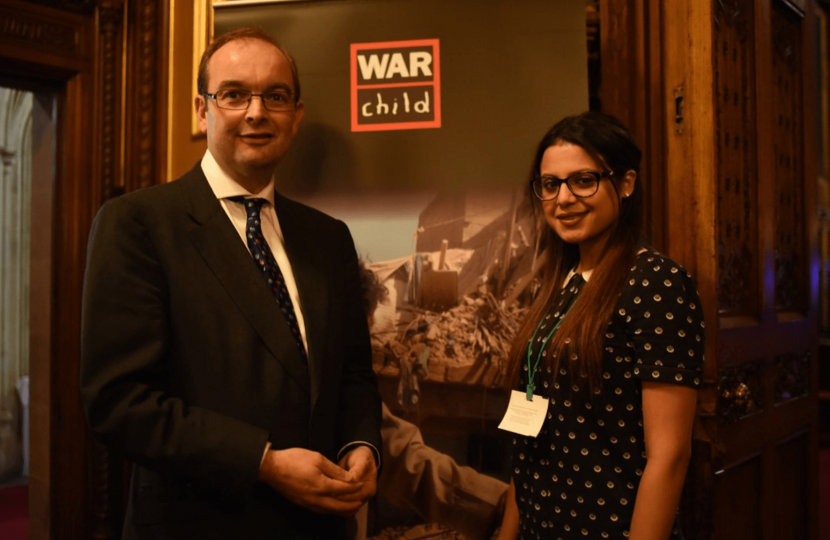
James Duddridge Local Member of Parliament for Rochford and Southend East Shows Concern for Wellbeing of Children Affected by Conflict at Parliament
On Monday 15th January, James Duddridge, MP for Rochford and Southend East supported War Child UK, the charity for children affected by conflict, by attending an event outlining the action needed to support the mental health and wellbeing of children affected by war in a parliamentary event at Speaker’s House, Westminster.
War Child’s report, Reclaiming Dreams – prioritising the mental health and psychosocial wellbeing of children in conflict, shows the scale of mental health and psychosocial support (MHPSS) urgently needed to help children recover from the mental and emotional impact of their experiences and the destruction of their families and support networks.
War Child UK supports children affected by conflict across Africa, Asia and the Middle East, from those who have fled the brutal violence of so-called Islamic State in Iraq, to former child soldiers in the Central African Republic, and tens of thousands more.
The event was hosted by Stephen Twigg MP, Chair of the International Development Committee with speeches from Ann Clwyd MP and young people from War Child’s youth engagement panel with first-hand experience of living in warzones, to highlight a drastically underfunded issue for communities torn apart by war.
James said:
“I am delighted to support War Child and raise awareness for the crucial need for better mental health and wellbeing support to children affected by conflict.
This issue is one that is close to my heart, and I would encourage the government to follow the recommendations made by War Child so that we can improve the lives of some of the world’s most vulnerable children.”
Stephen Twigg MP, Chair of the International Development Committee Said:
“War Child’s highly valuable work demonstrates the vital importance of giving priority to the mental wellbeing of children affected by conflict. Considering what these children have lived through, it is important that investment in mental health for children is given a much higher priority”.
Rob Williams, CEO of War Child UK said:
“It’s really encouraging that the UK and the Department for International Development is taking a leading global role in prioritising the importance of mental health for children affected by conflict.
Children will carry their experiences for the rest of their lives unless governments and the humanitarian community prioritise this essential service.”
In 2017, 250 million children around the world were affected by conflict, many children have been exposed to excessive levels of armed violence, witnessed the destruction of their homes, schools, communities, and the death of loved ones.
Many have been forced to flee far from their homes and communities and remain displaced for years, while for those who remain, the decimation of infrastructure makes access to basic services and a decent standard of living extremely difficult.
War Child’s report finds that daily stressors within children’s family have been found to have as much, and in some instances more, of an impact on children’s mental health as exposure to conflict itself. Daily stressors include domestic violence, parental stress caused by poverty, insecurity, lack of food, water, and heating, child labour, lack of access to education for children, stigma and exclusion.
Children’s physical needs are more commonly met by the humanitarian community through the provision of shelter, food and water, but their needs for mental health and psychosocial support are often not addressed.
Without adequate support children risk developing greater psychological, social and emotional problems later in life, severely limiting the ability of children, families and communities to rebuild post-conflict. Children’s support networks are key to strengthening children’s own mental health and psychosocial wellbeing.
War Child is calling for 1% of global humanitarian funding to be ring-fenced for MHPSS.
